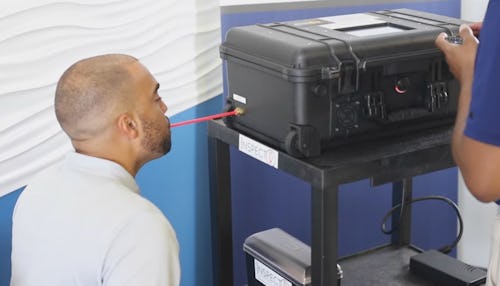The FDA just approved a very quick, very accurate COVID breathalyzer test
Good riddance, brain-poking swabs.

For the past several months, scientists have been trying to develop a breathalyzer test that can detect COVID faster and more efficiently than PCRs, which have been the gold standard for detecting the ‘Rona. But after a long wait, the FDA has finally granted emergency authorization for the InspectIR breathalyzer, meaning that all that brain-poking and nostril-violating might become obsolete in our near future.
This is how the InspectIR Breathalyzer works: Essentially, it separates and identifies five types of Volatile Organic Compounds (VOCs) that are associated with COVID. If it detects the presence of any of these compounds, you’ve likely contracted the virus. The machine that analyzes the compounds is about the size of a carry-on suitcase, which means it can be transported and samples don’t need to be sent to a lab, per CNN.
The FDA tested the InspectIR Breathalyzer and found that in a study of 2,409 people, it correctly identified 91.2% of positive cases and 99.3% of negative cases. They gave similarly accurate results for people infected with Omicron, which is still the dominant variant in the U.S. Most importantly, results were ready in just three minutes, which is great news considering that one of the keys to containing the pandemic during big outbreaks is to test as many people as we can, faster. Although results are pretty accurate, the FDA still suggested that positive results should be confirmed by a follow-up PCR test.
For now, InspectIR is planning to produce 100 of these breathalyzers per week, each of which will be able to analyze about 160 tests per day. After that, production is expected to increase by about 64,000 tests per month, per the FDA. Testing more people for COVID could definitely help us mitigate the next big wave, since those who do have COVID will be able to isolate sooner and those who do not can go on about their lives. On a personal note, this will be a breathalyzer test I’ll actually look forward to taking, especially since it will mean no more tears of Q-tip-induced agony.